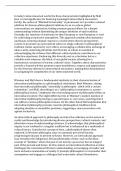Other
Personal Assignment Philosophy
- Course
- Institution
1) On the pages 68-71 Mall discusses in 7 points what Intercultural Philosophy is and what it is not. Choose those three characteristics mentioned by Mall that YOU think are most important for intercultural encounters today and give reasons why you think these are important. 2) Intercultural Ph...
[Show more]



